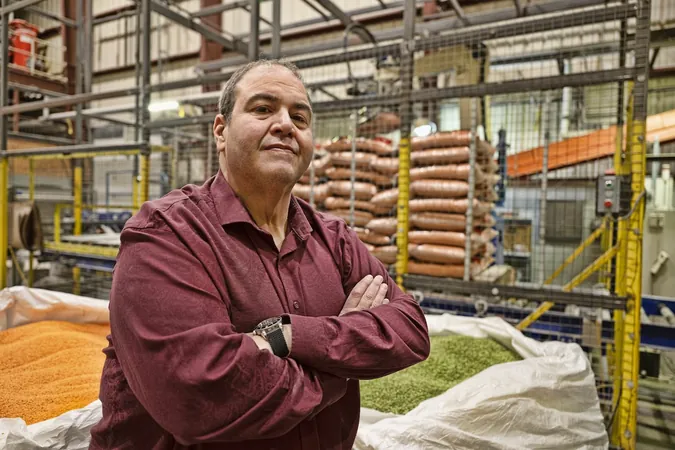
Lentil King of Saskatchewan Shares Bold Strategies to Tackle Canada’s Trade Challenges
2025-03-25
Author: William
In an era marked by economic uncertainty and the shifting landscape of global trade, insights from experienced leaders can illuminate paths forward. One of those voices is Murad Al-Katib, the CEO of AGT Foods and Ingredients, affectionately dubbed the “Lentil King of Saskatchewan.” With a remarkable career that began in a government role as a trade officer, Al-Katib transitioned to entrepreneurship when he launched his company in 2001 from his basement. Today, AGT has skyrocketed to a staggering $3.5 billion in revenue, employs around 3,600 individuals globally, and maintains a presence in over 120 countries.
Al-Katib recently addressed pressing topics regarding Canada’s agricultural trade, especially concerning renewable fuels and tariffs, during an interview from AGT's headquarters in Regina.
One key factor behind the recent decision by Federated Cooperatives to temporarily halt two major projects, including a renewable diesel facility, was the skyrocketing construction costs in Western Canada, which have surged 40% to 60%, far outpacing inflation rates. Coupled with significant policy shifts from the U.S. administration under the Inflation Reduction Act, Al-Katib emphasized that Canada’s lack of a robust response or incentives for the clean fuels sector was a pivotal issue. He expressed hopes for a more streamlined approach from Canada's government to ensure competitiveness in renewable energy.
When addressing the looming tariff threats to the Canadian agriculture industry, Al-Katib highlighted the historically protectionist approach of U.S. administrations, noting that despite these challenges, there exists a mutual dependency between the Canadian and U.S. agricultural markets. Canadian exports significantly contribute to the U.S. food system, with products like canola and durum wheat playing vital roles in U.S. food security. Al-Katib believes that this integration can help alleviate some of the tensions surrounding tariffs, particularly in the spheres of food and energy security.
With past experiences, including dealing with India's steep tariff hikes on lentil imports — which reached up to 66% on peas — Al-Katib shared strategies that AGT employed to pivot in response to sudden market shifts. Focusing on expanding markets in North Africa and the Middle East was essential during those challenging times, and he emphasized the need for Canadian companies to remain agile in navigating geopolitical landscapes.
Furthermore, Al-Katib called on the Canadian government to adopt a more collaborative strategy towards trade. He remarked on the pressing need to tackle inter-provincial trade barriers, claiming that an integrated domestic strategy could vastly enhance Canada's agricultural economy, valued at approximately $145 billion annually.
He posited that Canada must invest significantly in trade infrastructure, noting the importance of linking roads, railways, and ports to improve the distribution of high-quality Canadian food products. Al-Katib advocates for a strategic plan that also incorporates advancements in digital infrastructure, enhancing agricultural productivity through precision farming technologies.
As Al-Katib looks ahead, he is optimistic about Canada’s agricultural future, underscoring the importance of adapting to the global economy's demands while leveraging the country's unique resources. He envisions a transformative path forward, where Saskatchewan could produce an additional 10 million tonnes of agricultural products, not simply to be exported, but to create jobs and strengthen the local economy.
In conclusion, Al-Katib’s wealth of experience and vision offers crucial insights into how Canada can navigate its trade challenges and seize opportunities. His perspective on agricultural innovation and strategic partnerships serves as a rallying call for a sector poised for growth in the ever-evolving global landscape.









 Brasil (PT)
Brasil (PT)
 Canada (EN)
Canada (EN)
 Chile (ES)
Chile (ES)
 Česko (CS)
Česko (CS)
 대한민국 (KO)
대한민국 (KO)
 España (ES)
España (ES)
 France (FR)
France (FR)
 Hong Kong (EN)
Hong Kong (EN)
 Italia (IT)
Italia (IT)
 日本 (JA)
日本 (JA)
 Magyarország (HU)
Magyarország (HU)
 Norge (NO)
Norge (NO)
 Polska (PL)
Polska (PL)
 Schweiz (DE)
Schweiz (DE)
 Singapore (EN)
Singapore (EN)
 Sverige (SV)
Sverige (SV)
 Suomi (FI)
Suomi (FI)
 Türkiye (TR)
Türkiye (TR)
 الإمارات العربية المتحدة (AR)
الإمارات العربية المتحدة (AR)